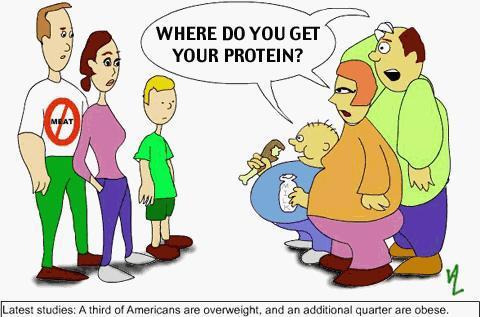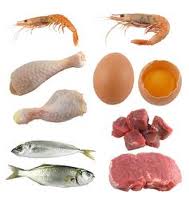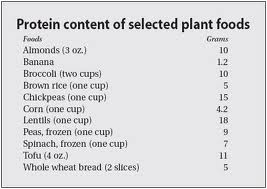So if you don’t eat meat or dairy, where do you get your protein?
Why do I hear that question so much? It’s because an estimated 95% of the people in the western world truly believe that we humans actually “need” to include animal products in our diet in order to be healthy. But with people like Bill Clinton and Oprah eating mostly plants these days, that misconception is beginning to fade.
Because our “need” for animal protein has been drilled into our brains for our entire lives, it is no wonder that it is difficult to cast aside. This page was created to provide you with a “big picture” explanation of how we came to believe this myth about animal protein and to help you come to grips with how you’re going to live a healthy life without it.
My most recent post on this topic addressed the question, “How do you get enough protein from plants if you’re a highly-trained athlete?” Animal Protein—Professional athletes don’t need it either. (posted on 3-23-12).
So how do I answer the protein question in a social situation? Some courteous variation of the following:
- “Actually, plants have a great deal of protein, in just the right quantities for humans. Did you know that, calorie for calorie, broccoli has more protein than sirloin?”
- “Like our closest relative in the wild, the gorilla or chimpanzee, I get my protein from whole plants.”
- “The same place the strongest animals in the world (elephants, giraffes, horses, etc.) get their’s — from whole plants.”
- “Virtually every plant has some protein in it, some more than others.”
- “Many cultures of people throughout the world live their entire lives without eating animal products — and their incidence of chronic diseases like cancer and heart disease is near zero.”
- “We now know that our #1 killer, heart disease and type 2 diabetes are both nearly 100% reversible with a 100% plant-based diet — completely free of meat and dairy.”
It is understandable if you’re still not convinced. That’s because one big question remains.
If all of the above is true, then why hasn’t my doctor told me about it? For that matter, why is my doctor still eating meat and dairy at every meal?
These are good questions, the answer to which took up an entire 100-page section of The China Study — it was entitled “Why haven’t I heard all of this before?” We also devoted a similar chapter to this topic in our book. But no matter how many books you may read, it’s likely going to take awhile before the general population fully believes that all they need to eat for optimal health is whole plants, in nature’s package. Hopefully, this Protein page will help you come to grips with this nutritional truth. We have tried our best to provide sane, non-judgmental answers to all of your questions.
What about Vitamin B12? Good question. Since this essential vitamin is not found in plant-based foods, I follow the simple advice of Dr. T. Colin Campbell and take a 2000 microgram sublingual supplement twice a week. Why didn’t Nature put some of this in plants? Our ancestors in the wild got theirs from the bacteria in the soil on their food, but today’s farming and sanitation methods have taken away that source. For more info, check out this blog that features a two-minute video by Dr. Michael Greger on B-12.
If you don’t already have one, you should get your own copy of The China Study by Dr. T. Colin Campbell of Cornell. In this “gold standard” book, he goes into great detail explaining with scientific proof why we not only do not “need” animal protein in our diets, but also why those animal foods are a large part of the problem with regards to our chronic diseases. As he explains, animal protein is associated with heart disease, cancer, stroke, type 2 diabetes and other chronic diseases.
Here are a few earlier posts on the protein topic that you might find helpful:
Protein—There’s only one way not to get enough of it…(posted on 3-11-12) Virtually every whole plant food has at least some protein in it—some a lot more than others.
Where do you get your protein? Just another look at some answers to the question that I hear more than any others. It took a lot of “repetition” to learn the wrong information about protein, and it’s going to take a lot of “repetition” to set it aside for the scientifically proven truth.

Bill Clinton making a point about his “plant-based” diet to Wolf Blitzer on CNN. You can see this video on the Video tab of this website.
Where is Bill Clinton getting his protein these days? As you may know, back in the fall of 2010, our former president announced on CNN with Wolf Blitzer that he was now on a plant-based diet with “no meat and no dairy.” Not to lose weight, but to reverse heart disease. When a former president starts casting aside the nutritional “wisdom” of the USDA Food Pyramid in favor of a plant-based diet, it is time for you to start paying attention. You can see this 2-minute clip on the Video tab of this site.
Vitamin B-12, omega-3s; a few questions — Let me hear yours. Tony Gonzalez, all-pro tight end for the Atlanta Falcons is featured in this one. After reading The China Study a few years ago, he met with Dr. Campbell and shifted to a near 100% plant-based diet — and reportedly, he is now stronger than ever.
Michelle Obama…coming up short on healthy eating While Michelle is doing a lot of great things, she could be a much greater influence if she really understood what Bill Clinton now knows about a health-promoting plant-based diet.
“Academic freedom” in nutritional science…a scary story As you may know, medical doctors are not trained how to prevent or reverse disease in med school. They are taught how to treat symptoms, not causes; they are taught to diagnose, prescribe drugs, and conduct procedures. But, you would think that the nation’s elite schools of nutrition would be teaching the absolute best ways to promote our health with food. Unfortunately, not YET.
Humans “need” no animal products—EVER! (6-23-13). Many vegetarians continue to believe that they “need” to add some animal foods to their diets in order to make sure they get enough of all the essential nutrients. I do not believe that “any” animal products are necessary or desirable—and neither do my colleagues at the T. Colin Campbell Foundation. In our 4Leaf approach, we try to give people a little “wiggle room” in the interest of a broader acceptance of a “mostly whole plants” dietary regimen. We simply encourage everyone to derive the vast majority of their calories from whole plants.

Gotta love this cartoon. Do you think they are really worried that we’re not getting enough protein?
Protein 101. As you may know, protein is one of three macronutrients (with calories); the other two are fat and carbohydrate. Virtually all plants have some of all three — in just the right proportion for the human body. Animal foods only have protein and fat. If one eats a variety of fresh fruits, vegetables, grains, legumes, nuts and seeds, he or she will most assuredly get ALL of the three macronutrients that they need.
As all of the MD’s in our book will tell you, “The only way you will NOT get enough protein is if you don’t consume enough calories.” Judging from the ample waistlines in this country, that certainly doesn’t seem to be happening.
As for plant sources of protein, you might find the following chart helpful:
Another critical point is that the only animal protein we ever truly “need” is from our mother’s milk — which, by the way, only derives about 5% of it’s calories from protein. And this is during the time when our bodies are doubling in weight every few months. Now that we are adults, most Americans are getting over 10% of their calories from animal protein and Mother Nature is having her revenge by destroying our health.
What about fish? You’re probably thinking that you’ll want to continue eating fish so you can get those omega-3s. The problem is that along with those omega-3s, you’re also getting a whole lot of fat, cholesterol, pollutants—AND that animal protein that does your body no good. For more on this topic: FISH…the natural diet for humans? A “big picture” view
Finally, Dr. Campbell says that the only protein problem in the western world is that people are getting far too much animal protein. What about too much plant protein? Science has shown that too much plant-based protein is not a problem; it’s also virtually impossible to get too much protein from plants.
If all this makes sense, you should kiss your protein worries goodbye, climb aboard the 4Leaf train, and eat all the whole plants you want – when you want.
Want to find out how healthy your family is eating? Take our free 4Leaf Diagnostic Survaey It takes less than five minutes and you can score it yourself. After taking the survey, please give me your feedback as it will be helpful in the development of our future 4Leaf app for smartphones. Send feedback to jmorrishicks@me.com

 Follow us on Facebook and Twitter. Want to receive some occasional special news from us? You may wish to Join our periodic mailing list. For daily updates you can choose to “FOLLOW” at the top of the right column.
Follow us on Facebook and Twitter. Want to receive some occasional special news from us? You may wish to Join our periodic mailing list. For daily updates you can choose to “FOLLOW” at the top of the right column.
If you’d like to order our book on Amazon, visit our BookStore now.

J. Morris Hicks, working daily to promote health, hope and harmony on planet Earth.
For help in your own quest to take charge of your health, you might find some useful information at our 4Leaf page or some great recipes at Lisa’s 4Leaf Kitchen.
Got a question? Let me hear from you at jmorrishicks@me.com. Or give me a call on my cell at 917-399-9700.
Please SHARE and rate this post below
Blogging daily at hpjmh.com…from the seaside village of Stonington, Connecticut – Be well and have a great day.
—J. Morris Hicks, board member, T. Colin Campbell Foundation








Dr. Nick Delgado knew and worked with Nathan Pritikin who was an early advocate of a low-fat diet and lifestyle change.
http://healthwatchman.com/worlds-strongest-vegan/
Rick
This might be a starting point. There is no exact number of grams , it’s a very individual thing, however there are ball-park numbers. I’d say the best way to know is how you are traveling with your athletics. Is your performance improving the way you want ? Are you constantly fatigued, or are your muscles not repairing themselves? While some fo the answers to these questions lie in your training regime, the rest is diet. I hope this helps and encourages you to do your own research.
Donna
http://www.menshealth.com/mhlists/guide-to-protein/recommended-protein-intake.php
Ok. Ok. I get it. I really do. I don’t eat animals or their products So please don’t give me the same pat answers folks are stuck on. . Please don’t mention animal source protein in your answer to my question. Here it is: What is the protein need of a 45 year old male who is 6’2″ and 190 pounds who is very active, i.e. 4 times per week heavy weight lifter and 5 times per week (60 minutes per session) intense cardio? I cannot get a clear answer. It’s not printed anywhere. Folks just keep talking about the brainwashing Americans get about the need for animal protein. I want to know the need an athlete has got plant protein. I am so hopeful that someone can give a real answer with specific amounts.
Bodybuilding literature has historically recommended 1 gram of protein for every kilo of bodyweight daily, for a typically active adult male to maintain current lean muscle mass. Note that this is not specifically animal protein. You would need to increase your protein intake from there, based on your own level of activity and your own physiology; some people just put muscle on faster than others. However, 1g:1kg is not as much as one might think, so the starting point is not terribly high.
forget grams….focus on calories only….make sure you meet your specific energy needs and that’s it.
What about Vitamin B-12?
I am studying Chinese Medicine . The college where I am studying has a strong bias against vegetarianism and the teachers love love love to tell of the deficiencies that a vegetarian diet causes and teach of every sort of nasty flesh product. Believe it or not, they once showed a video on how to prepare dog penis as medicine!!!). The majority of my classmates seem to believe meat and vegetables are health foods and grains, beans, dairy are harmful. When I told the argument to my biology prof that the biggest, strongest, longest-lived animals in the world get their protein from grass he replied that they often have more than one stomach or at least some special capacity to get every last drop of nutrient from the grass and that humans cannot. I replied that luckily we do not need to eat grass but bountiful varieties of vegetarian foodstuff. He said we have canines and are omnivores and then stopped the conversation.
Just want to thank you.
I am just beginning my journey of the celebration of plant based eating. Unlearning the academia on the foods “to” eat of this western world is like a lifting of a veil over my eyes. I am seeing the ways of the world in a different light as to how everything is intertwined. Along with the eye opening education I am obtaining through great books, great blogs and new networking — I have never FELT SO GOOD! WOW!
Again, thanks for the blogs…it is a daily boost to who I am.
D. Welsh